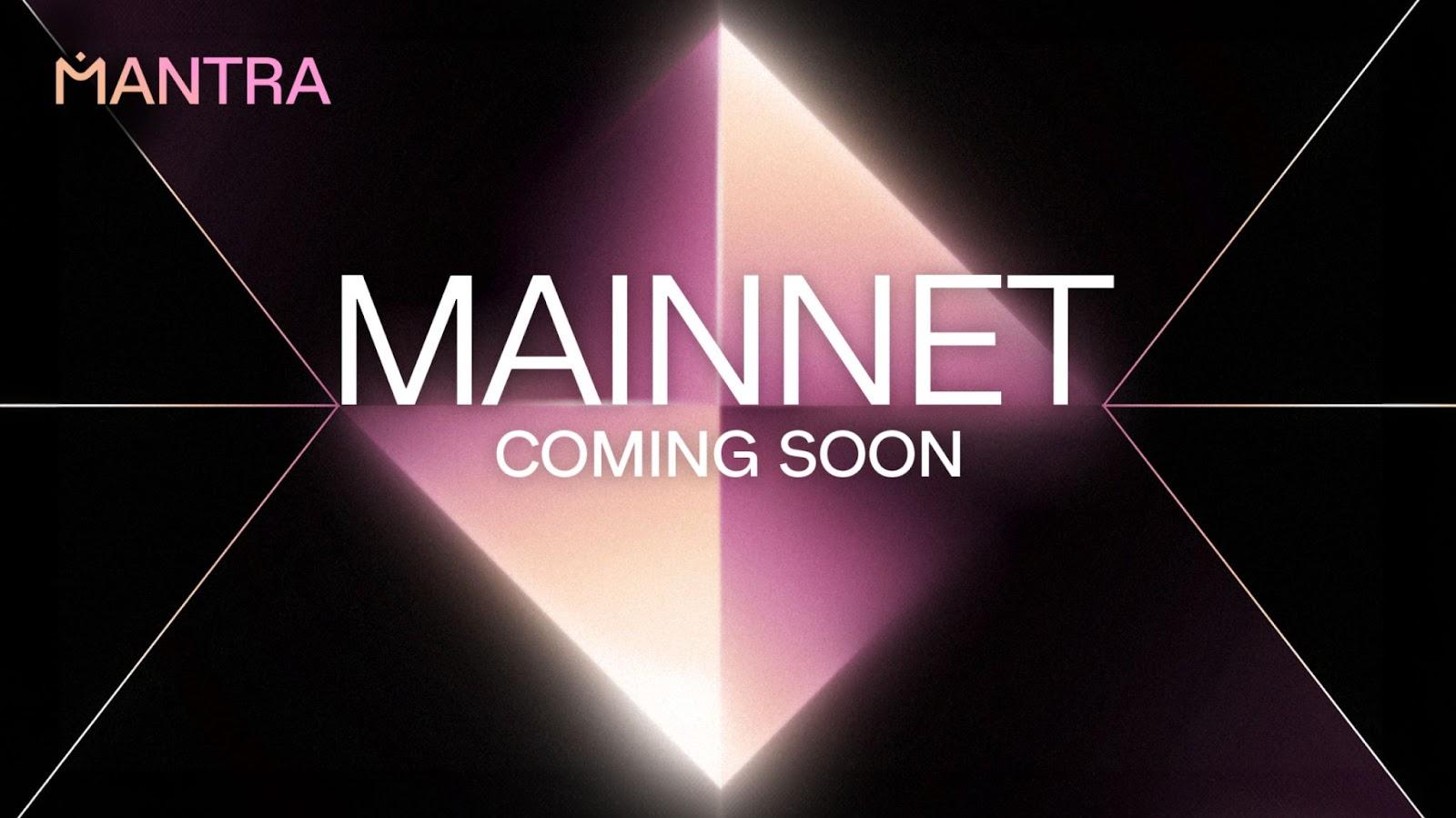


The MANTRA Chain Mainnet, set to launch in October 2024, aims to become the preferred ledger for real-world assets and attract institutional capital into the decentralized finance (DeFi) space. With a focus on network security and stability, the mainnet hopes to reduce counterparty risk and unlock a multitrillion-dollar market for on-chain financing. This could greatly enhance DeFi's ability to engage with traditional financial structures and provide a new asset class for enterprises and sectors.
MANTRA: A Revolutionary Blockchain for Real-World Assets
Background
MANTRA is an ambitious blockchain project aiming to bridge the gap between traditional finance and the decentralized finance (DeFi) world. Established in 2021, MANTRA is developing a mainnet set to launch in October 2024.
Mission and Goals
MANTRA's primary mission is to establish itself as the preferred ledger for real-world assets. By tokenizing physical assets and connecting them to the DeFi ecosystem, MANTRA hopes to attract institutional capital and expand the scope of DeFi beyond speculative trading and lending.
Furthermore, the mainnet prioritizes network security and stability to mitigate counterparty risk. This enhanced security will provide a reliable platform for enterprises and sectors to engage with DeFi, unlocking a vast market for on-chain financing.
Top 5 FAQs
1. What is the current status of the MANTRA project?
Currently, MANTRA is in its development phase, working towards the mainnet launch in October 2024.
2. Why is MANTRA focused on real-world assets?
MANTRA recognizes the immense potential for DeFi to impact traditional industries by offering innovative financing solutions. Real-world assets provide a stable foundation for such solutions, attracting institutional capital and expanding the market.
3. What are the key benefits of the MANTRA mainnet?
4. How will MANTRA tokenization benefit real-world assets?
Tokenization allows real-world assets to be represented on the blockchain, enabling fractional ownership, increased liquidity, and enhanced transparency.
5. When was MANTRA established?
MANTRA was founded in 2021, with the goal of revolutionizing the finance industry through blockchain technology.
Conclusion
MANTRA is a highly anticipated blockchain project that aims to transform the financial landscape by bridging the gap between traditional finance and DeFi. By empowering real-world assets through tokenization and emphasizing security, MANTRA is poised to unlock a multitrillion-dollar market and contribute significantly to the growth and adoption of the DeFi ecosystem.

Prime Minister Narendra Modi's campaign to help Indians reclaim their unclaimed funds has brought back approximately Rs 2000 crore to its rightful owners, with efforts to reach even remote areas through facilitation camps and web portals. The campaign, launched in October 2025, has revealed that approximately Rs 78,000 crore is lying untouched in bank accounts, Rs 14,000 crore with insurance companies, Rs 3,000 crore in mutual funds, and Rs 9,000 crore in unclaimed dividends. PM Modi appeals to the public to check the portals for any unclaimed funds, which could bring significant changes to countless lives in the country.

Amazon has announced plans to invest a whopping $35 billion in India by 2030 to drive AI-driven digitisation, boost exports, and create jobs. This investment is almost double that of Microsoft's and over two times that of Google's investment plans for the country. Amazon has already invested $40 billion in India, making it the largest foreign investor in the country. It also aims to expand its "Accelerate Exports" program and partner with the Apparel Export Promotion Council to reach more businesses and tap into international markets.

Telangana's two-day global summit, inspired by the World Economic Forum in Davos, aims to attract foreign investment and establish a long-term strategic roadmap for the state's economy. Day 1 featured high-profile meetings and discussions about transforming Telangana into a $3 trillion economy by 2047, aligning with India's national development goals. Day 2 will see CM Revanth Reddy engage with industry leaders across core sectors, with a focus on signing MoUs to boost investment and job creation in industries like textiles, electronics, and AI.

After a meeting between Microsoft CEO Satya Nadella and Prime Minister Narendra Modi, the company announced a $17.5 billion investment in India for AI development. This doubles their previous commitment and will be made over four years to support the country's ambitions. With India's youth eager to innovate and leverage the power of AI, this investment will drive widespread diffusion and also see the launch of Microsoft's largest hyperscale region in India.

Microsoft has announced a major investment of over Rs 1.58 lakh crore ($17.5 billion) in artificial intelligence (AI) development in India. This comes after CEO Satya Nadella met with Prime Minister Narendra Modi to discuss the country's potential in the field of AI. The investment will focus on building infrastructure, developing skills, and supporting sovereign data systems needed to accelerate India's efforts to become a global center for AI innovation. Microsoft's commitment aligns with India's broader push to integrate AI into various industries such as healthcare, manufacturing, and finance. Other tech giants, including Intel and Cognizant, are also looking to invest in India and boost the country's artificial intelligence ecosystem.

Following his meeting with Prime Minister Narendra Modi, Microsoft CEO Satya Nadella announced the company's largest-ever investment in Asia--US$17.5B--to support India's ambitions in the AI space. This investment will focus on developing digital infrastructure, enhancing skill development, and building sovereign AI capabilities tailored for India's needs. PM Modi welcomed this significant boost to India's technology ecosystem and hailed it as a major opportunity for the country's youth to drive innovation and build a more sustainable future. The investment is expected to strengthen India's position as a global AI hub and support large-scale adoption of AI across sectors.

JioHotstar, a leading Indian entertainment platform, has announced a massive investment of ₹4,000 crore over five years to boost South India's creative economy. The company has also established a partnership with the Tamil Nadu government, with a shared goal of accelerating the state's production and creative ecosystem. This alliance will not only create job opportunities but also introduce new formats, stories, and initiatives to nurture the next generation of storytellers. Deputy Chief Minister Udhayanidhi Stalin has also expressed his enthusiasm for the partnership, recognizing the transformative potential of art and cinema in shaping society.

Save money and future headaches with these must-have deals on portable power stations and solar panels. With power outages becoming more common, it's important to be prepared with reliable backup energy sources. Check out these great deals on top-rated models that will keep your devices running during outages and outdoor adventures. Don't miss out on the opportunity to snag a high-quality power station and panel at their lowest prices of the year. Hurry and make your purchase before it's too late!

The second day of the Telangana Rising Global Summit witnessed a surge of interest from domestic and international companies looking to invest in the state. Chief Minister Revanth Reddy held multiple meetings with representatives from prominent firms such as Sumadhura Group and TCCI Taiwan Group, resulting in multiple MoUs being signed. Notable attendees, including Taj GVK's Managing Director Shalini Bhupal, further cemented the commitment to fostering investment in Telangana. In related news, cement manufacturers are expected to see a boost in profitability this fiscal year due to improved realisations and steady selling prices.

Telangana Chief Minister A. Revanth Reddy is set to participate in nearly 20 high-level meetings at the Telangana Rising Global Summit. He will engage with industry leaders in sectors such as education, power, tourism, and artificial intelligence, as well as oversee the signing of MoUs with major corporations. The day will also include a virtual inauguration of Telangana Thalli statues and a meeting with Anand Mahindra to discuss investments in green mobility and rural enterprise sectors. At the summit's end, the Chief Minister will unveil the Telangana Rising Vision Document and celebrate the state's progress and innovation. Additionally, Samsung has rolled out the One UI 8.5 beta in India for Galaxy S25 users, bringing new features such as editing tools, smarter sharing, improved connectivity, and stronger security.